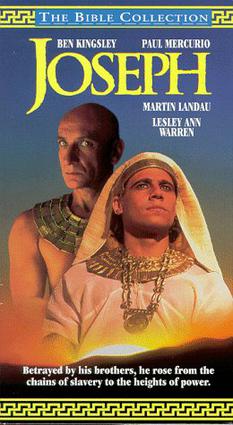Plot
In Ancient Egypt, Joseph is a Hebrew slave to Potiphar, Pharaoh Ahmose I's captain of the guard. The overseer Ednan torments Joseph for his refusal to show deference, but Joseph earns his respect by reading, and Ednan increasingly relies on Joseph. Potiphar's wife unsuccessfully tries to seduce Joseph, and falsely accuses him of rape. Joseph explains his life story to Potiphar to restore trust.
Joseph is the second youngest son of Jacob and Rachel; the latter having died after giving birth to Benjamin. One day, Jacob gives Joseph a beautiful coat and makes him his successor; feeling he's more trustworthy than Simeon and Levi who'd endangered the tribe by sacking Shechem after their prince raped their sister Dinah, as well as Reuben who'd committed adultery with Leah's handmaiden Bilhah. Enraged by this and blinded by jealousy, Joseph's half-brothers dump him into a lot of snakes and sell him into slavery; except for Reuben who tried to save him.
Potiphar announces that Joseph will go to Pharaoh's prison for humiliating his wife. In prison, Joseph earns a reputation as a talented interpreter of dreams. He makes two accurate interpretations of the dreams of the royal cupbearer and the royal baker, both imprisoned on suspicion of theft.
Pharaoh summons Joseph to interpret his own troubling dreams. Joseph says the seven fat cows and the seven full ears of corn in the dream mean there will be seven years of plenty, but the seven sickly cows and the seven thin ears of corn signify seven years of severe famine caused by a drought. Joseph suggests that all the farmers give one-fifth of their crops to Pharaoh for storage for the coming famine. Impressed, Pharaoh appoints Joseph as governor, second only to Pharaoh; he also gives Joseph a wife, Asenath. Potiphar and Ednan now serve under Joseph.
Seven years later, the famine began. Joseph and Asenath have two sons, Manasseh and Ephraim. In Canaan, Jacob learns of the abundance in Egypt and sends most of his sons to buy grain. Joseph recognizes his brothers, accuses them of spying, and throws them into prison; where Reuben declares his belief they're being divinely punished for betraying their family. Joseph insists they prove their innocence by bringing the youngest brother Benjamin to Egypt.
After the brothers bring Benjamin, he is framed for theft and arrested. When they rise up against their guards, Joseph reveals his true identity to all of them. Benjamin immediately embraces Joseph, but the others are ashamed. Joseph embraces each one in turn, saying that God used their evil intentions for the ultimate good, preparing Joseph for his current position so that he can provide for his extended family.
Joseph sends his brothers home to bring Jacob and the entire settlement to Egypt during the remaining five years of the famine. The clan arrives in Egypt to be reunited with Joseph.
This page is based on this
Wikipedia article Text is available under the
CC BY-SA 4.0 license; additional terms may apply.
Images, videos and audio are available under their respective licenses.
